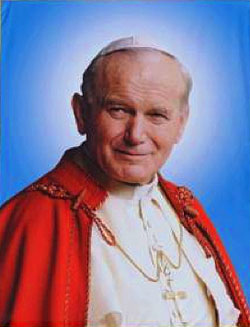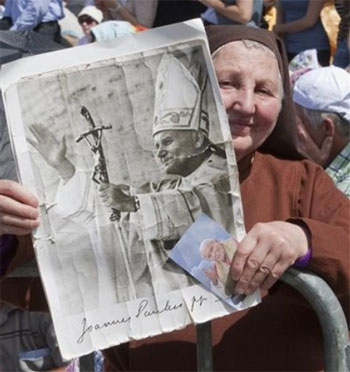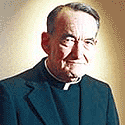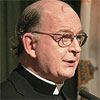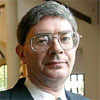VATICAN CITY, JAN. 14, 2011 (Zenit.org).- Here is the full text of the decree written by the Congregation for Saints' Causes regarding the beatification of Servant of God John Paul II, published today by Vatican Radio. The prefect of the saints' causes dicastery is Cardinal Angelo Amato.
Beatification: Sign of the depth of faith and invitation to a fully Christian life
The proclamation of a Saint or of a Blessed by the Church is the fruit of putting together various aspects regarding a specific Person. First, it is an act which says something important in the life of the Church herself. It is linked to a "cult," i.e. to the memory of the person, to his full acknowledgment of him in the awareness of the ecclesial community, of the country, of the Universal Church in various countries, continents and cultures. Another aspect is the awareness that the "presentation on the altars" will be an important sign of the depth of the faith, of the diffusion of faith in the path of life of that person, and that this sign will become an invitation, a stimulus for us all towards a Christian life ever more profound and full. Finally, the sine qua non condition is the holiness of the person's life, verified during the precise and formal canonical proceedings. All this provides the material for the decision of the Successor of Peter, of the Pope in view of the proclamation of a Blessed or of a Saint, of the cult in the context of the ecclesial community and of its liturgy.
John Paul II's pontificate was an eloquent and clear sign, not only for Catholics, but also for world public opinion, for people of all color and creed. The world's reaction to his lifestyle, to the development of his apostolic mission, to the way he bore his suffering, to the decision to continue his Petrine mission to the end as willed by divine Providence, and finally, the reaction to his death, the popularity of the acclamation "Saint right now!" which someone made on the day of his funerals, all this has its solid foundation in the experience of having met with the person who was the Pope. The faithful have felt, have experienced that he is "God's man," who really sees the concrete steps and the mechanisms of contemporary world "in God," in God's perspective, with the eyes of a mystic who looks up to God only. He was clearly a man of prayer: so much so that it is from the dynamism of his personal union with God, from the permanent listening to what God wants to say in a concrete situation, that the whole of "Pope John Paul II's activity" flowed. Those who were closest to him have been able to see that, prior to his meetings with his guests, with Heads of State, with Church high officials or ordinary citizens, John Paul II would recollect himself in prayer according to the intentions of the guests and of the meeting that was to come.
1. Karol Wojtyla's contribution to Vatican II Council
After Vatican II, during the pontificates of Paul VI and of John Paul II, the manner of presentation, and thus of self-presentation of the papacy, has become quite expressive. On the occasion of the 25th anniversary of the pontificate of John Paul II, the Italian Minister for Foreign Affairs published in 2004 a book entitled "Go Forth in the Whole World." Giancarlo Zizola, a "vaticanist," remarked on the fact that "the papacy has conquered its citizenship in the realm of public visibility, breaking away from the siege of worship marginalisation where it had been kept by decree of secular society, in the name of a militant vision of the liberal tenet of Separation of Church and State" (p. 17). A German historian, Jesuit Klaus Schatz, speaking of Paul VI and of John Paul II, underlined the meaning of the "papacy on the way" -- thus in conformity with Vatican II -- more in the manner of a missionary movement than as a static pole of unity. Schatz refers to the manner of interpreting the papal mission as a challenge to "confirm the brothers in the faith" (Luke 22:32), in a way tied to structural authority, but with a strong spiritual and charismatic hint, in link with the personal credibility and rooted in God himself.
Let us pause a moment to consider Vatican II. The young archbishop of Cracow was one of the most active Council Fathers. He made a significant contribution to the "Scheme XIII" which was to become the Pastoral Constitution of the Council "Gaudium et Spes" on the Church in the Modern World, and to the Dogmatic Constitution "Lumen Gentium." Thanks to his studies abroad, bishop Wojtyla had a concrete experience of evangelisation and of the mission of the Church, in Western Europe or in other continents, but above all of totalitarian atheism in Poland and in the other countries of the "Soviet Block." He brought all this experience to the Council debates, which were certainly not like drawing-room conversations, extremely courteous but void of contents. Here was a substantial and decisive effort to insert the Gospel's dynamism into the conciliar enthusiasm rooted on the conviction that Christianity is capable of furnishing a "soul" to the development of modernity and to the reality of the social and cultural world.
All this was to be of use in preparing for the future responsibilities of the Successor of Peter. As John Paul II said, he already had in his mind his first encyclical, "Redemptor Hominis," and brought it to Rome from Cracow. All he had to do in Rome was to write down all these ideas. In this encyclical, there is a wide invitation to humankind to rediscover the reality of Redemption in Christ: "Man (…) remains a being that is incomprehensible for himself, his life is senseless, if love is not revealed to him, if he does not encounter love, if he does not experience it and make it his own, if he does not participate intimately in it. This, as has already been said, is why Christ the Redeemer 'fully reveals man to himself.' [...] man finds again the greatness, dignity and value that belong to his humanity. In the mystery of the Redemption man becomes newly 'expressed' and, in a way, is newly created. [...] The man who wishes to understand himself thoroughly -- and not just in accordance with immediate, partial, often superficial, and even illusory standards and measures of his being -- he must with his unrest, uncertainty and even his weakness and sinfulness, with his life and death, draw near to Christ. He must, so to speak, enter into him with all his own self, he must 'appropriate' and assimilate the whole of the reality of the Incarnation and Redemption in order to find himself (No. 10). [...]
"This union of Christ with man is in itself a mystery. From the mystery is born 'the new man,' called to become a partaker of God's life, and newly created in Christ for the fullness of grace and truth. [...] Man is transformed inwardly by this power as the source of a new life that does not disappear and pass away but lasts to eternal life. [...] This life, which the Father has promised and offered to each man in Jesus Christ (…) is in a way the fulfilment of the 'destiny' that God has prepared for him from eternity. This 'divine destiny' is advancing, in spite of all the enigmas, the unsolved riddles, the twists and turns of 'human destiny' in the world of time. Indeed, while all this, in spite of all the riches of life in time, necessarily and inevitably leads to the frontier of death and the goal of the destruction of the human body, beyond that goal we see Christ. 'I am the resurrection and the life, he who believes in me ... shall never die'" (No. 18).
2. "Totus Tuus": Trust in Mary Mother of God
The life of John Paul II was totally devoted to the service of the Lord, by the intercession of the Mother. His motto was "Totus Tuus," whether for the good of the Church or for that of man who is the way for the Church ("Redemptor Hominis," No. 14). This is the "raison d'être" of the international Apostolic Voyages, the daily meetings with people, with those in charge of ecclesial communities, with cardinals and bishops, with the Heads of other Churches and Christian communities, the Heads of other religions, and with the laity. This is equally true of the written documents of the Pope, the diplomatic relations of the Holy See with the States and International Organisations. The deep conviction of the value of Vatican II -- not only on the necessity but also about the possibility, by the Church, to bring the Gospel of Christ and build on it the experience of the Church as a vibrant and energising inspiration of the vision and mechanisms of the modern world -- this has always been the Pope's conviction.
In 1989, the Berlin Wall fell, but on the international level, one could feel the destructive force of the commercial mechanisms and of the particular economic and ideological interests, ever more anonymous, bringing injustice and marginalisation to all peoples -- even of certain social groups in well developed countries -- and in particular, one could perceive how human life has been devalued. In his many International Apostolic Voyages in the various continents, the Pope voiced the Gospel of Christ and the Church's preoccupation. He wrote it in a more systematic way in the encyclicals: "Laborem Exercens," "Sollicitudo Rei Socialis," "Centesimus Annus"; and also "Evangelium Vitae," "Veritatis Splendor," "Fides et Ratio"; and the encyclicals dealing directly with life and the apostolate of the Church, like "Dominum et Vivificantem," "Redemptoris Missio," "Ut Unum Sint," "Ecclesia de Eucharistia."
3. The Iraq war and the "peace offensive"
Sometimes, as in the case of the efforts to avoid war between the United States and Iraq, there is a real "peace offensive" not only in order to save people's lives, but also to bring to a halt the growth of hatred and of the insane ideas about civilisation clashes, or about the new phenomenon of world scale terrorism. Thus, the New Year address to the diplomatic Corps accredited to the Holy See, and the unforgettable February 2002 with the series of meetings of the Pope with diplomats of "first category": J. Fischer (Feb. 7); Tarek Aziz (Feb. 14); Kofi Annan (Feb. 18); Tony Blair (Feb. 22); José Maria Aznar and the envoy of Seyyed Mohammad Khatami, Head of the Islamic Republic of Iran (Feb. 27); and finally, because of the humanly unbearable situation, the decision to send Cardinal Etchegaray on a special mission to Baghdad (Feb. 15) and Cardinal Pio Laghi to Washington (March 3-9). The "February of the Pope" came to a conclusion with the meeting of Cardinal J.L. Tauran with the 74 ambassadors and diplomats from the entire world; as the Secretary for the Relations with the States, the "Minister for Foreign Affairs" of the Pope, Cardinal Tauran made an appeal in order to avoid war, and called to mind all that the Pope had said in his "peace offensive."
4. Year 2000 Jubilee: a historical reality to remember the coming of Jesus of Nazareth
The current task of John Paul II was centred on the pastoral and life of the Church: the Bishops' "ad limina" visits from the entire world, the Wednesday audiences and the Sunday meetings with the faithful for the Angelus, the pastoral visits of Roman parishes. All was done to promote the proclamation of Christ, to bring closer to our knowledge His Person and the fact that "the words that Christ has said when he was about to leave the Apostles tell us about the mystery of man's history, of one and all, the mystery of humankind's history. Baptism in the name of the Father and of the Son and of the Holy Spirit is an immersion in the living God, "in the One who is, who was and who will be." Baptism is the start of the encounter, of unity, of communion, and of this earthly life is but a prologue and an introduction; fulfilment and fullness belong to eternity. "This world's figure is fading away." We must therefore find ourselves "in the world of God", in order to reach the goal, to come to the fullness of life and of man's vocation" (Cracow, June 10, 1979).
"This was precisely one of the things that John Paul II wanted most: to explain clearly that we look to Christ who comes; of course, to the One who came, but even more to the One who comes, and that, in this perspective, our faith keeps us oriented towards the future. In this way, we are really capable of presenting the message of faith, in a new manner, in the perspective of Christ who comes," (Benedict XVI, "Light of the World").
The Great Jubilee of Redemption, in the Year 2000, was not for John Paul II a "pretext" for pastoral action, but first and foremost a historical reality reminding us of the coming of Jesus of Nazareth and everything that this historical event has brought, viz. Redemption, the Testimony of the Love of God unto the Cross and Resurrection, the life of the early Church, the path of salvation accomplished by the Saviour by which He has introduced his Church as a sign and an instrument of internal unity with God, as well as that of the human family. The Year 2000 Jubilee reminds us of the Holy Land, the land of Jesus, and of Rome, the place of apostolate of the Successor of Peter, the bond of authenticity of the message and of the unity of the ecclesial community. This message has been reformulated in the Apostolic Letters Tertio Millenio Adveniente and Novo Millennio Ineunte. But, for the Pope, what mattered most was the personal thanksgiving and that of the entire Church to our Lord Jesus and the encounter in faith with the One who has loved to the end, who has saved us and remains a sign so sorely needed in a world that is becoming increasingly deaf, while trying to organise its life as if God did not exist, thus erring without identity and without meaning.
5. Attention to the youth and the meaning of WYD
John Paul II used to evaluate the results of the international Apostolic Voyages with his collaborators, to identify what was well done, and to see to the changes for the coming voyages. After the voyage in Poland in 1991, the Pope noticed that, during the Mass in Warsaw, in the farthest parts, the young people came and went away, drank beer or coca-cola, and came back. "It was not like this during the previous voyages," he noted, "there has been a change in the society's mentality. It is not worth looking at the 'first places.' The VIP are always seated in the same manner, but the 'margins' are important and worth our attention." It is worth noting that the Pope did not use the word "crowd": he has always seen and paid attention to "people." He was very attentive to the role of the laity in the life and mission of the Church. It is quite meaningful that, when he was still University chaplain in Cracow, he exploited a brief period of "political thaw" in 1957 to organise -- in collaboration with the archbishop of Wroclaw, Boleslaw Kominek -- a symposium in the city for more than 100 university students from all Poland (for the first time since decades!) precisely on the theme "The role of lay people in the Church" (and that was years before Vatican II!). Later, during the summer vacations, he organized spiritual exercises at the place of the Ursuline Sisters of the Roman Union in Bado Ślaskie for a slightly smaller group of the participants of the symposium of Wroclaw, precisely to promote the "formation of the laity."
With the creation of the World Youth Days, the Pope gave his support to various forms of activity of the lay people in the life and mission of the Church, thus paving the way to the very meaningful initiatives, some years later, during the pontificate of Benedict XVI: the holding in September 2010 in Korea, of an important Congress for the lay Catholics of Asia; the meetings of African bishops who are ever more encouraging the lay people to hold positions of responsibility in the sectors of evangelisation, social activity and in the Church's educational sphere; the significant presence of lay Catholics in the continental Mission of Latin America.
Reviewing his pontificate, Benedict XVI makes a note of the generation changes on a world scale, and comes to the same conclusion as his predecessor, namely that "times have changed." Meanwhile a new generation has come, with new problems. The generation of the late sixties, with its own peculiarities, has come and gone. Even the following generation, more pragmatic, is ageing. Today, one must ask: "How can we cope with a world that threatens itself, and in which progress becomes a danger? Should we not start all over again from God?" (Light of the World). So Benedict XVI makes an appeal "that a new generation of Catholics may rise, people inwardly renewed who would commit themselves in politics without any inferiority complex" (an idea oft repeated by the Pope, namely in the Message for the 46th Social Week of Italian Catholics, Oct. 12, 2010). He goes on to call for a new generation of good intellectuals and scientists, attentive to the fact "that a scientific perspective that ignores the ethical and religious dimension of life becomes dangerously narrow, just as a religion would, if it were to refuse a legitimate contribution of science to our understanding of the world" (London, St. Mary's College, Sept. 17, 2010); the Pope calls for a "new generation of committed Christian laypeople capable of seeking, with competency and moral rigor, solutions of sustainable development" (Sept. 7, 2008).
6. The simplicity of John Paul II's prayer
When we recall what John Paul II has accomplished, the "big events" are mixed with the remembrance of simple moments of prayer, which have been a source of surprise even to his collaborators. I'll mention only two, coming from two different periods of his life. In the seventies, I was students' chaplain at the Catholic University in Lublin. At the beginning of the academic year, the then Cardinal of Cracow came to take part in the Eucharist at the university church, in the official inauguration of the big Hall, and for lunch. After that, the Cardinal was ready to return to Cracow. The Rector of the University, Fr. Krapiec, accompanied him to the car, but stopped to chat with another guest, so much so that they were late to arrive at the car. But lo! The Cardinal had "disappeared"! The ten seconds they waited seemed like ten centuries. The Rector, accustomed to having everything under control, did not know where the Cardinal could have gone to. He asked me: "Where is Wojtyla? The Cardinal has disappeared! Where is he?" With a slight mocking smile, I took some time before answering him, just to tease him a bit. Then I told him: "He has probably gone to the church." There we went, and sure enough, we found the Cardinal, kneeling in prayer in front of the Way of the Cross.
The other recollection was in 1999, during his seventh Apostolic Voyage in Poland. It lasted for 13 days, with 22 stops in the programme, from the North to the South of the country. A programme well beyond the physical capabilities of the Pope. One of those days, there was to be -- according to the programme -- the blessing of the Sanctuary of Lichen, the Eucharist in Bydgoszcz, then a meeting with the university people, the liturgy of the Sacred Heart, in link with the beatification of Fr. Frelichowski in another city, in Torun, then back to Lichen for the overnight stay. A more than busy day! Thus, after dinner, the papal suite went to bed immediately. But the Pope just locked himself in the chapel for a long, a very long moment of prayer. There remained only three of us: Bishop Chrapek, in charge of the visit planning for the episcopate; myself, as "assistant," and the famous Camillo Cibin, head of the Vatican security. At last the Pope came out of the chapel to go to his bedroom. Cibin said to me: "Father Andrea, bring me a chair. But one that is hard, made of wood, not a sofa, two cups of coffee, strong coffee, and an apple." All this was to help him wait all night at the door of the Pope's bedroom, which was not totally closed, to ascertain if the Pope -- not only tired but also advanced in years -- was breathing normally or if he had any need of assistance. The personal holiness of the Pope was something over and above the esteem he enjoyed among his closest collaborators, and that was quite significant.
7. The will of John Paul II
John Paul II was conscious of the fact that we are experiencing a very trying moment in history, that the Successor of Peter has the duty to confirm in the faith, but he was equally conscious of the fact that the most important aspect was to depend on God. The will he wrote in 1979, and which he modified every year, during the spiritual exercises, gives us a powerful testimony of this. From Feb. 24 to March 1, he wrote:
"24.II – 1.III.1980. During these spiritual exercises, I reflected on the truth of Christ's Priesthood in view of the Passage which is, for each of us, the hour of our own death. For us, parting from this world -- to be reborn in the next, the world to come, eloquent sign (he adds the word decisive above it), is the Resurrection of Christ. […] The times we live in have become unspeakably difficult and worrying. The life of the Church has also become difficult and tense, a characteristic trial of these times -- for the faithful and for the pastors. In some countries (like the one which I read about during the spiritual exercises), the Church finds herself in a time of persecution equal to that of the first centuries, maybe more, according to the degree of cruelty and hatred. Sanguis martyrum -- semen christianorum. Furthermore, so many innocent people have disappeared, even in this country where we are living […]
"Once again I wish to entrust myself totally to the Lord's grace. He will decide when and how I am to end my earthly life and my pastoral ministry. In life as in death, Totus Tuus, through the Immaculate. By already accepting this death, I hope that Christ give me the grace for this last passage, that is (my) Pasch. I equally hope that he renders it useful for this more important cause I try to serve: the salvation of human beings, the protection of the human family, in all nations and among all peoples (among these I am thinking in particular of my own earthly country), useful for those who, in a special way, have been entrusted to me, in the Church, for the glory of the same God."
On the March 5, 1982, he added: "The attempt on my life, on 13.V.1981, has confirmed, in a certain way, the accuracy of the words written during the 1980 spiritual exercises (24.II – 1.III). I feel even more deeply that I am completely in the Hands of God -- and I remain constantly available to my Lord, entrusting myself to Him in His Immaculate Mother (Totus Tuus)."
Then, on the March 17 of the Jubilee Year 2000, No. 3: "As for every year, during the spiritual exercises, I read my will of the 6.III.1979. I continue to maintain the provisions contained in it. What has been added, at that time and during the following spiritual exercises, constitutes a reflection of the difficult and tense general situation which has marked the eighties. Since the autumn of 1989, this situation has changed. The last decade of the past century was free of the previous tensions; this does not mean there were no new problems or difficulties. In a special way, may the Divine Providence be praised for this, in that the so-called 'Cold War' period has ended without violent nuclear conflict, a threat which weighed on the world during the previous period" (words underlined by the Pope himself).
8. An essential aspect of the new blessed: "God is the foundation of all our efforts"
This is again an essential aspect, if one wishes to understand more deeply the personality of the Church's new Blessed, Karol Wojtyla – John Paul II. The foundation of all the efforts of our life is in God. We are covered by divine love, by the results of Redemption and Salvation. But we must help people to become deeply rooted in God himself; we must do everything possible to create personal and social attitudes rooted in the reality of God. This requires patience, time and the ability to see everything through the eyes of God.
The last, brief pilgrimage of Pope John Paul II in Poland, more specifically in his "small country", in Cracow, Wadovice and the Way of the Cross (of Kalwaria Zebrzydowska), showed a determination, but also a spiritual acuity "in the process of maturation in time" so that all humankind, especially the ecclesial and Christian community, can understand more fully some of the fundamental aspects of faith. Since the beginning of his pontificate, in 1978, John Paul II often spoke in his homilies of the mercy of God. This became the theme of his second encyclical, "Dives in Misericordia," in 1980. He was aware that modern culture and its language do not have a place for mercy, treating it as something strange; they try to inscribe everything in the categories of justice and law. But this does not suffice, for it is not what the reality of God is about.
9. Entrusting the world to Divine Mercy
Later on, the Pope took some steps to finalise the process of Beatification of Sr. Faustina Kowalska, and the canonisation (2000). The whole ecclesial community was brought to feel the closeness of the person so intimately linked to the message of Mercy; this facilitated the development of the topic for John Paul II, showing the reality of Divine Mercy in the many contexts around the world, in various continents, of humanity today.
Finally, in August 2002, in Lagiewniki, where Sr. Faustina lived and died, John Paul II entrusted the world to Divine Mercy, to the unlimited trust in God the Merciful, to the One who has been a source of inspiration, but also of strength for his service as Successor of Peter. "It is the Holy Spirit, the Comforter and Spirit of Truth, who leads us on the ways of Divine Mercy. By convicting the world "concerning sin, righteousness and condemnation" (John 16:8), he reveals at the same time the fullness of salvation in Christ. This convicting concerning sin is doubly related to the Cross of Christ. On the one hand, the Holy Spirit enables us, through the Cross of Christ, to recognize sin, any sin, in the dimension of evil which it contains and hides. On the other hand, the Holy Spirit enables us, again through the Cross of Christ, to see sin in the light of the mysterium pietatis, i.e. of the forgiving and merciful love of God (cf. "Dominum et Vivificantem," No. 32). Thus, the "convicting concerning sin" also becomes a conviction that sin can be forgiven, and that man can recover the dignity of a beloved son of God. The Cross is in fact the most profound humbling of God before man. The Cross is like a touch of eternal love on the most painful wounds of man's earthly existence" ("Dives in Misericordia," No. 8).
This truth will always be brought to mind by the cornerstone of this Sanctuary, extracted from Mount Calvary, in a certain way under the Cross on which Jesus Christ conquered sin and death. (…) How much the world is in need of the mercy of God today! In every continent, from the depths of human suffering, a cry for mercy seems to rise. In those places where hatred and the thirst for revenge are overwhelming, where war brings suffering and the death of innocents, one needs the grace of mercy to pacify the minds and the hearts and make peace spring forth. In those places where there is less respect for life and human dignity, one needs the merciful love of God, in whose light we see the ineffable value of every single human being. Mercy is needed to ensure that every injustice may find its solution in the splendour of truth. So today, in this Sanctuary, I solemnly wish to entrust the world to Divine Mercy. I do so with the burning desire that the message of God's merciful love, proclaimed here through Saint Faustina, may reach all the inhabitants of the earth and fill their hearts with hope. May this message spread from this place to our beloved homeland and throughout the world. May the binding promise of the Lord Jesus be fulfilled: from here has to come out "the spark that will prepare the world for his final coming" (Homily in Lagiewniki, 17thAugust 2002).
Thus did the last months in the life of Pope John Paul II, marked by suffering, bring his Pontificate to its fulfillment.
